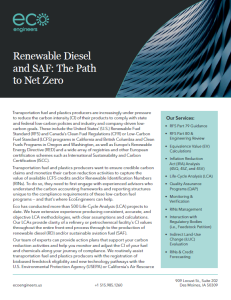
Transportation fuel and plastics producers want to ensure credible carbon claims and monetize their carbon reduction activities to capture the value of available LCFS credits and/or Renewable Identification Numbers (RINs). To do so, they need to first engage with experienced advisors who understand the carbon accounting frameworks and reporting structures unique to the compliance requirements of these low-carbon fuel programs — and that’s where EcoEngineers can help.
Eco has conducted more than 500 Life-Cycle Analysis (LCA) projects to date. We have extensive experience producing consistent, accurate, and objective LCA methodologies, with clear assumptions and calculations. Our LCAs provide clarity of a refinery or petrochemical facility’s CI values throughout the entire front-end process through to the production of renewable diesel (RD) and/or sustainable aviation fuel (SAF). Our team of experts can provide action plans that support your carbon reduction activities and help you monitor and adjust the CI of your fuel and chemicals along your journey of compliance. We routinely assist transportation fuel and plastics producers with the registration of
biobased feedstock eligibility and new technology pathways with the U.S. Environmental Protection Agency (USEPA) or California’s Air Resources Board (CARB), prepare product applications and certifications, interface with local regulatory agencies, and deliver documentation, auditing, and validation.
In addition, Eco is your trusted guide in optimizing your response to emerging energy policies and training your compliance team on carbon market reporting. Our process starts with education led by EcoUniversity, which provides training workshops, market outlooks, an intensive Carbon Literacy training program, and condensed board and management training modules.
Our Services:
- RFS Part 79 Guidance
- RFS Part 80 & Engineering Review
- Equivalence Value (EV) Calculations
- Inflation Reduction Act (IRA) Analysis (45Q, 45Z, and 45V)
- Life-Cycle Analysis (LCA)
- Quality Assurance Programs (QAP)
- Monitoring & Verification
- RINs Management
- Interaction with Regulatory Bodies (i.e., Feedstock Petition)
- Indirect Land-Use Change (iLUC) Evaluation
- RINs & Credit Forecasting

Kristine Klavers, Managing Director, Petroleum & Refining | kklavers@ecoengineers.us




